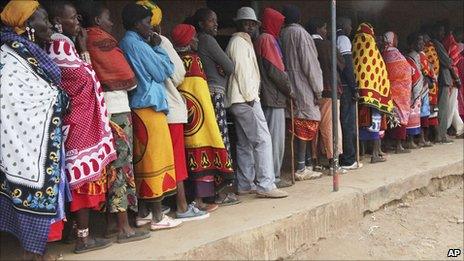Kenya holds referendum as part of political peace deal
- Published

Some voters began queuing before polling stations opened
A count is under way in Kenya after its referendum on a new constitution, a key measure for political reform.
The BBC's Peter Greste in the west of the country says voting appears to have passed off without incident, which would be a first for the country.
Early results suggest approval for the measures in most parts of the country - as opinion polls had indicated.
The vote was part of a deal to end violence after the 2007 election, when more than 1,000 people died.
If approved, the new document would limit presidential powers and set up a commission to settle land disputes.
The early results, which are based on a count of five million ballots out of a potential 12.4m, suggest 66% voted for the new constitution, while 34% were against.
However, our correspondent says that some areas, such as the Rift Valley, were strongly opposed to the vote.
Supporters include both the president and the prime minister, who stood against each other in 2007.
But opponents say the new constitution will only make matters worse.
'Encouraging start'
The post-election violence in late 2007 and early 2008 left about 1,300 people dead and 300,000 homeless.
Our correspondent says it is too early to declare this poll an unqualified success since violence traditionally comes during the count.
Even if the constitution is passed there remains a lot to do to make it work, but the early stages of this process are an encouraging start, our correspondent adds.
No major incidents were reported at the 27,689 polling stations set up to cater for Kenya's 12.5 million registered voters.
"From the reports I have received, it is peaceful all over the country and we want this to remain that way so that Kenyans can peacefully decide their future," Prime Minister Raila Odinga said after casting his vote in Kibera.
"I have no doubt in my mind that the 'Yes' will win resoundingly."
President Mwai Kibaki, who defeated Mr Odinga in the disputed 2007 election, said after casting his ballot in Othaya that he was pleased with how voting had been conducted.
"At this moment, we want everyone to be calm, and not be people who are violent," he said.
"There is no conflict, let's continue properly, so that we finish developing our country."
There was some violence during the referendum campaign - most notably in June, when a grenade attack on a Church-organised "No" rally in the capital Nairobi left six people dead.
Correspondents say tension was especially high in the volatile Rift Valley Province, home to most of the "No" campaigners, where land is a contentious issue.
Disputes between rival ethnic groups over land were behind some of the most violent incidents after the 2007 election.
The current constitution was negotiated with the British in London in the early 1960s.
Those in favour of the new constitution argue that for the first time it introduces a sensible approach to land reform by stating that land acquired illegally can be repossessed.
But those against it say this will increase ethnic divisions and trigger chaos.
A leading opponent of the new constitution, cabinet minister William Rato, told the BBC the draft contained "fundamental flaws".
He called, instead, for a constitution that would "create harmony and unity" in Kenya.
- Published3 August 2010
- Published26 July 2010